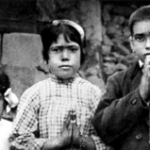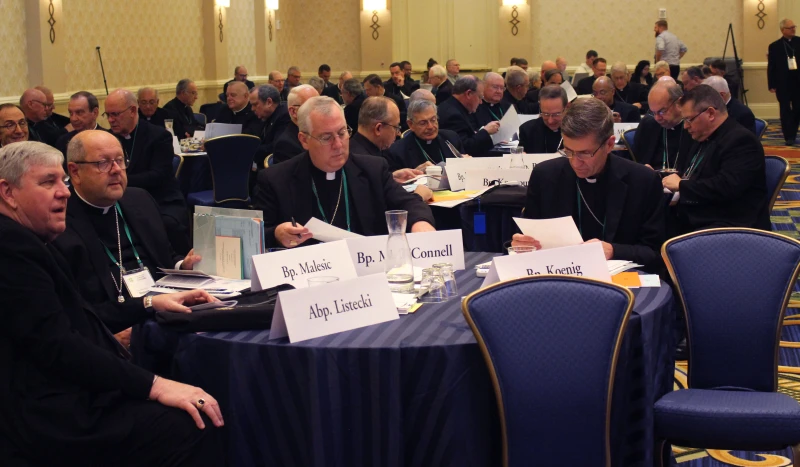
The U.S. bishops meet for their 2022 annual fall general assembly in Baltimore. / Credit: Katie Yoder
CNA Staff, Oct 2, 2025 / 13:46 pm (CNA).
Political and religious debate has continued to ferment in the wake of Illinois Democratic Sen. Dick Durbin’s withdrawal from a prominent Catholic award after backlash over his decades of support for pro-abortion politics.
Durbin was scheduled to receive a “Lifetime Achievement Award for support to immigrants” at a Chicago archdiocesan event in November. But criticism from numerous U.S. bishops led the senator to back out of the award ceremony on Sept. 30.
Pope Leo XIV even weighed in on the controversy prior to Durbin’s decision, seemingly coming at least partly to the senator’s defense on Sept. 30 when during a press conference at the Vatican he argued that it was “important to look at the overall work that a senator has done [during] 40 years of service in the United States Senate.”
The Holy Father, a Chicago native, argued that such political disputes are “complex.”
“I don’t know if anyone has all the truth” regarding such issues, he said, urging those who disagree with each other to “have respect for one another” amid debates.
Leo in that exchange argued in favor of a consistent ethic of life.
“Someone who says I’m against abortion but says ‘I’m in favor of the death penalty’ is not really pro-life,” the pope told journalists. “Someone who says that ‘I’m against abortion but I’m in agreement with the inhuman treatment of immigrants who are in the United States,’ I don’t know if that’s pro-life.”
‘A hierarchy of truths’
Bishop Daniel Thomas of Toledo, Ohio, the chair of the U.S. Conference of Catholic Bishops’ pro-life committee, argued this week that there exists a “hierarchy of truths” regarding the sanctity of life.
“There’s no question that people across the board are vulnerable, but who are the most vulnerable?” Thomas told OSV News. “Those are the innocent and completely vulnerable little children in the womb who cannot defend themselves.”
Durbin himself, meanwhile, expressed surprise over the “level of controversy” surrounding his intended receipt of the award.
The senator, who has served Illinois in the U.S. Senate since 1997 and previously served in the U.S. House of Representatives, told NBC News that he withdrew from the award “because the reaction has been so controversial” against Chicago Cardinal Blase Cupich.
“[I] see no point in going forward with that,” he told the U.S. network, though he said Pope Leo’s remarks were “amazing” and that he “didn’t expect” the pope to seemingly come to his defense.
Durbin has long been vocal in his support for abortion rights. He opposed abortion earlier in his political career but told the late Tim Russert in 2005 that he had come to change his mind on the matter, claiming that there are “certain times in the life of a woman” when an abortion is necessary.
The senator was more outwardly supportive of abortion in 2022 following the repeal of Roe v. Wade when he said that the Supreme Court had “eliminate[d] a federally protected constitutional right that has been the law for nearly half a century.”
“As a result, millions of Americans are waking up in a country where they have fewer rights than their parents and grandparents,” he said.
Durbin vowed to “keep fighting to enshrine into law a woman’s right to make her own reproductive choices,” arguing against “[letting] our children inherit a nation that is less free and more dangerous than the one their parents grew up in.
The senator has received praise from pro-abortion advocates. He has regularly been awarded a “100” score from the group Reproductive Freedom for All — formerly NARAL Pro-Choice America — for his years of favorable votes toward pro-abortion policies.
Susan B. Anthony Pro-Life America, meanwhile, gives Durbin an “F” award for having “consistently voted to eliminate or prevent protections for the unborn and for children born alive after failed abortions,” among other pro-abortion positions.
After days of backlash, various U.S. bishops expressed relief at Durbin’s backing out of the award. Similar to Thomas, Bishop Michael Burbidge of Arlington, Virginia, said after Durbin’s withdrawal that the Church’s “public witness to the Gospel” requires it to “show the hierarchy and unity of all truths.”
In announcing Durbin’s decline of the award, Cardinal Blase Cupich on Sept. 30 argued against “total condemnation” of Catholic political leaders who fail to espouse the entirety of the Church’s teaching.
“[A] positive approach can keep alive the hope that it is worth talking to one another — and collaborating with one another — to promote the common good,” the prelate argued.
Thomas, meanwhile, told OSV News this week that the “promotion of direct killing of infants in the womb” is “a very grave matter.”
“I think we have to say there is a moral hierarchy here of life,” he said. “[C]ertainly doing one thing or another may be wrong, but the direct killing of children in the womb is the gravest of these things.”












